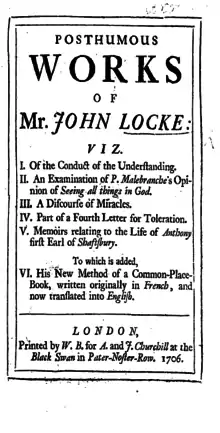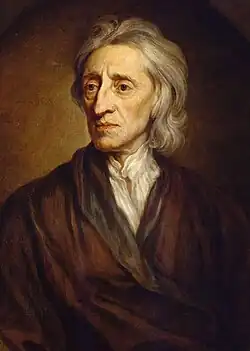Of the Conduct of the Understanding
Of the Conduct of the Understanding is a text on clear and rational thought by John Locke,[1] published in 1706, two years after the author's death, as part of Peter King's Posthumous Works of John Locke. It complements Locke's Some Thoughts Concerning Education, which explains how to educate children.[2]
 Title page from the first edition | |
| Author | John Locke |
|---|---|
| Country | England |
| Language | English |
| Subject | Education and Philosophy |
| Publisher | Awnsham and John Churchill |
Publication date | 1706 |
 |
| Part of a series on |
| John Locke |
|---|
|
Works (listed chronologically) |
| People |
| Related topics |
The text espouses the importance of rational self-examination and its virtues when combating mental illness. Moral purity and sanity were, according to Locke, inextricably linked to self-scrutiny and mental freedom.[3]
In this tract, Locke also points out that "there are instances of very mean people, who have raised their minds to a great sense and understanding of religion,” such as Huguenot “peasantry.”[4] In a 1731 sermon, delivered in New England and published the next year, George Berkeley countered that this Lockean observation had proven irrelevant to his examples of northeastern "peasant" communities, such as the Narragansett people, because they “do not at present amount to one thousand, including every age and sex. And these are nearly all servants or laborers to the English."[5] Despite these comments, Redwood Library and Athenaeum shareholders in Rhode Island, and even an author of the bylaws, included Of the Conduct of the Understanding in their personal "Farm" libraries.[6]
See also
- George Mason Memorial, Washington, D.C., includes Of the Conduct of the Understanding as an element of the statue of a seated Mason.[7]
References
- Locke, John (1690-01-01), Nidditch, Peter H (ed.), "An Essay concerning Human Understanding", The Clarendon Edition of the Works of John Locke: An Essay Concerning Human Understanding, Oxford University Press, p. 1, doi:10.1093/oseo/instance.00018020, ISBN 978-0-19-824386-1, retrieved 2023-01-24
- Baltes, John (2016-06-15). The Empire of Habit. Boydell and Brewer Limited. doi:10.1017/9781782047049. ISBN 978-1-78204-704-9.
- Makari, George (2015-11-26). "The man who made America: Reason, religion and the brilliant mind of John Locke". Salon. Retrieved 2023-01-24.
- Locke, John (1823). An Essay Concerning Human Understanding. T. Tegg. p. 226.
- Berkeley, George (1732). A Sermon Before the Incorporated Society for the Propagation of the Gospel. London, UK: J. Downing Printers. p. 8.
- Society, Rhode Island Historical (1914). Proceedings of the Rhode Island Historical Society. Society. p. 23.
- "List of Classified Structures". webarchive.loc.gov. Retrieved 2023-01-24.
External links
 Works related to Of the Conduct of the Understanding at Wikisource
Works related to Of the Conduct of the Understanding at Wikisource- John Locke, Of the Conduct of the Understanding, edited with General Introduction, Historical and Philosophical Notes and Critical Apparatus by Paul Schuurman